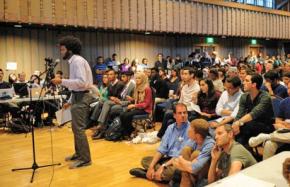A step toward justice at UC
reports on new developments in the BDS campaign at UC Berkeley.
THE STRUGGLE for justice in Palestine is advancing at the University of California (UC), despite efforts to intimidate campus critics of Israeli apartheid.
On April 18, the UC Berkeley Student Senate voted 11-9 for a bill that calls for divestment from Israeli apartheid, making it the fourth UC student government to do so this academic year.
The UC Irvine student government was the first to call for divestment in November 2012, and the UC Riverside and UC San Diego student governments followed with similar resolutions in March 2013. The UC Riverside student government has since been pressured to reverse itself and revoke its resolution.
The UC Berkeley Student Senate vote took place at about 5:30 in the morning, after 10 hours of debate in a campus hall overflowing with hundreds of students. Pulitzer Prize-winning author and activist Alice Walker was among the many community members who packed in to support the divestment bill. Black Power movement leader Angela Davis, speaking across town at a Palestinian Prisoners' Day event earlier that evening, asked her audience of hundreds to support the divestment bill.

The bill describes UC as a "complicit third-party" and seeks divestment of $14 million in UC Retirement Program and General Endowment assets from companies such as Caterpillar, Cement Roadstone Holdings and Hewlett-Packard.
Student senator Sadia Saifuddin said she was proud to stand "with dozens of diverse communities in continuing the struggle against oppression, occupation and violation of human rights."
Student groups that supported the bill included the Arab Student Union, Black Student Union, International Socialist Organization, MEChxA, Muslim Student Association, Organization of African Students, Pilipino American Alliance, Queer Alliance and Resource Center, Students for a Democratic University and, of course, Students for Justice in Palestine.
Connor Landgraf, the president of the student government, has the power to veto any senate action within seven days of the decision. He told the Daily Californian, "It was a very close decision, and clearly, it's an issue in which our campus is divided...I will be thinking about [the vote] and deciding on that."
Chancellor Robert Birgeneau stated his opposition to the divestment bill in a statement released April 18. Birgeneau added that the student senate vote "will not change investment policy established by the Regents of the University of California."
ALL THIS raises some questions for Palestine solidarity advocates to answer.
How can Student President Landgraf be convinced to side with the majority of the student senate? And how can we enforce the will of the students in the face of administrative opposition? Furthermore, how can we neutralize efforts to put us back on the defensive?
A confident response to any and all attempts to intimidate or slander Palestinian, Arab, South Asian and Muslim students and allies will necessarily be part of any good answer to these questions.
A violent attempt at intimidation took place at UC Berkeley on April 1 when a student of color was punched in the face and knocked to the ground.
The activist was promoting a campus meeting titled "Israel Is an Apartheid State: The Case for Boycott, Divestment and Sanctions" when a large, white male approached him and asked, "Do you say Israel is an apartheid state?" When the activist answered in the affirmative, he was attacked. The assailant stood nearly a foot taller that the activist, who is slight of frame. The assailant quickly ran away and has not been identified.
Despite his opposition to divestment, Birgeneau condemned the assault as an attack on free speech. "All of our students must feel that the campus is a safe and inclusive environment for them, one in which they have the freedom to express their views without fear of intimidation," he said in a statement.
That might be a start, but free speech advocates should push for further condemnation of a violent attempt to silence criticism of Israel on campus. And we should ask President Connor Landgraf: Which side are you on? Do you stand with the Student Senate majority or with the bullies who would silence free speech? Students for Justice in Palestine urges supporters to contact Landgraf at president@asuc.org.
Finally, the left should take note of signs of a process of broader radicalization among UC Berkeley students. Earlier this spring, the student senate decided to divest from the prison-industrial complex and the fossil fuel industry, condemn Islamophobia and issue a statement of no confidence in campus policies regarding sexual assault.


